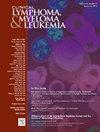慢性髓性白血病患者停止酪氨酸激酶抑制剂治疗和无治疗缓解(TFR):在真实世界的实践中,超过三分之二的患者成功实现了无治疗缓解(TFR)。
IF 2.7
4区 医学
Q2 HEMATOLOGY
引用次数: 0
摘要
背景:停止TKI治疗和无治疗缓解(TFR)已成为慢性期慢性髓性白血病(CP-CML)的新目标。本研究旨在估算3家三级医疗中心停止TKI治疗后的TFR:符合条件的 CP-CML 患者年龄≥16 岁,在 2022 年 6 月前曾尝试停止 TKI 治疗。收集的数据包括患者的人口统计学特征、预后评分、TKI治疗的类型和持续时间、应答日期、复发日期、对重新开始TKI治疗的应答以及复发的风险因素:55名患者(35名,63.6%为女性)中断了治疗,诊断时的中位年龄为40岁(16-74岁)。48名患者(87.3%)接受了伊马替尼一线治疗。29例(52.7%)患者在停用TKI时正在接受伊马替尼治疗。从确诊到停用TKI的中位时间为86个月(IQR为60;132),达到DMR后TKI治疗的中位持续时间为66个月(IQR为47;114)。中位随访 34 个月(IQR 12;68)后,15 例(27.3%)患者复发。中位复发时间为 5 个月(2-38 个月)。除 3 例(20%)患者外,大多数患者的复发发生在最初的 6 个月。所有复发患者在重新开始 TKI 治疗后的中位时间为 3 个月(2-6 个月)后均获得 MMR。没有一名患者进展到晚期:我们的经验证实,在常规临床实践中,CP-CML 患者停止 TKI 治疗是可行且安全的,超过三分之二经过仔细筛选的患者可以获得 TFR。本文章由计算机程序翻译,如有差异,请以英文原文为准。
Discontinuation of Tyrosine Kinase Inhibitor Therapy and Treatment Free Remission (TFR) in Chronic Myeloid Leukemia: Successful Achievement of TFR in More Than Two-Third of Patients in a Real-World Practice
Background
Discontinuation of TKI therapy and treatment-free remission (TFR) have become new goals for chronic-phase chronic myeloid leukemia (CP-CML). The aim of this study was to estimate the TFR post discontinuation of TKI therapy at 3 tertiary-care centers.
Patients and Methods
CP-CML patients aged ≥16 years who had an attempt to discontinue TKI therapy till June 2022, were eligible. The collected data included patients’ demographics, prognostic score, type and duration of TKI therapy, response dates, relapse dates, response to re-initiation of TKI therapy, and risk factors for relapse.
Results
Fifty-five patients (35, 63.6% females) with a median age of 40 (range 16-74) years at diagnosis discontinued therapy. Forty-eight (87.3%) patients received imatinib as first line therapy. Twenty-nine (52.7%) patients were receiving imatinib at the time of TKI-discontinuation. Median time from diagnosis to TKI discontinuation was 86 months (IQR 60;132) and median duration of TKI therapy after achieving DMR was 66 months (IQR 47;114). After a median follow up of 34 (IQR 12;68) months, 15 (27.3%) patients relapsed. Median time to relapse was 5 months (range 2-38). Most of the relapses occurred during the first 6 months except 3 (20%) patients. All the relapsed patients achieved MMR after a median of 3 (range 2-6) months after restarting TKI therapy. None of the patients progressed to advanced-phase.
Conclusion
Our experience confirms that discontinuation of TKI therapy in CP-CML patients is feasible and safe in routine clinical practice, and can achieve TFR in more than two-third of carefully selected patients.
求助全文
通过发布文献求助,成功后即可免费获取论文全文。
去求助
来源期刊

Clinical Lymphoma, Myeloma & Leukemia
ONCOLOGY-HEMATOLOGY
CiteScore
2.70
自引率
3.70%
发文量
1606
审稿时长
26 days
期刊介绍:
Clinical Lymphoma, Myeloma & Leukemia is a peer-reviewed monthly journal that publishes original articles describing various aspects of clinical and translational research of lymphoma, myeloma and leukemia. Clinical Lymphoma, Myeloma & Leukemia is devoted to articles on detection, diagnosis, prevention, and treatment of lymphoma, myeloma, leukemia and related disorders including macroglobulinemia, amyloidosis, and plasma-cell dyscrasias. The main emphasis is on recent scientific developments in all areas related to lymphoma, myeloma and leukemia. Specific areas of interest include clinical research and mechanistic approaches; drug sensitivity and resistance; gene and antisense therapy; pathology, markers, and prognostic indicators; chemoprevention strategies; multimodality therapy; and integration of various approaches.
 求助内容:
求助内容: 应助结果提醒方式:
应助结果提醒方式:


